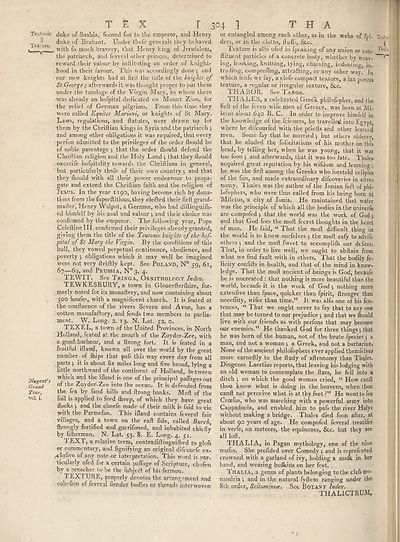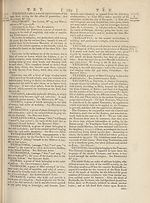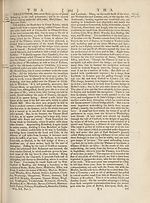Encyclopaedia Britannica, or, a Dictionary of arts, sciences, and miscellaneous literature : enlarged and improved. Illustrated with nearly six hundred engravings > Volume 20, SUI-ZYM
(346) Page 304
Download files
Complete book:
Individual page:
Thumbnail gallery: Grid view | List view

TEX r 304 ] T H A
Teutonic duke of Suabia, fecond fon to the emperor, and Henry
T x 're Brabant. Under tliefe generals they behaved
" with fo nuich bravery, that Henry king of Jerufaleni,
the patriarch, and feveral other princes, determined to
reward their valour by inftituting an order of knight¬
hood in their favour. This was accordingly done*, and
our new knights had at fint the title of the knights of
St George ; afterwards it was thought proper to put them
under the tutelage of the Virgin Mary, to whom there
was already an hofpital dedicated on Mount Zion, for
the relief of German pilgrims. From this time they
were called Equites Mariani, or knights of St Mary.
Laws, regulations, and ftatutes, were drawn up for
them by the Chriftian kings in Syria and the patriarch ;
and among other obligations it was required, that every
perfon admitted to the privileges of the order (Irould be
of noble parentage ; that the order (hould defend the
Chriflian religion and the Holy Land ; that they Ihould
, exercife hofpitality towards the Chriftians in general,
but particularly thofe of their own country.; and that
they fliould with all their power endeavour to propa¬
gate and extend the Chriftian faith and the religion of
Jesus. In the year 1190, having become rich by dona¬
tions from the fuperftitious,they eledled their firftgrand-
mafter, Henry Walpot, a German, who had diftinguifti-
ed himfelf by his zeal and valour ; and their choice was
confirmed by the emperor. The following year, Pope
Celeftine III. confirmed their privileges already granted,
giving them the title of the Teutonic knights of the hof-
pital of St Mary the Virgin. By the conditions of this
bull, they vowed perpetual continence, obedience, and
poverty *, obligations which it may well be imagined
were not very ftri&ly kept. See Poland, N° 59, 61,
67—69, and Prussia, N°3, 4.
TEWIT. See Tringa, Ornithology Index.
TEWKESBURY, a town in Gloucefterfhire, for¬
merly noted for its monaftery, and now containing about
500 houfes, with a magnificent church. It is feated at
the confluence of the rivers Severn and Avon, has a
, cotton manufactory, and fends two members to parlia¬
ment. W. Long. 2. 13. N. Lat. 52. o.
TEXEL, a town of the United Provinces, in North
Holland, feated at the mouth of the Zuyder-Zee, with
a good .harbour, and a ftrong fort. It is feated in a
fruitful ifland, known all over the world by the great
number of fhips that pafs this way every day from all
parts ; it is about fix miles long and five broad, lying a
little northward of the continent of Holland, between
Nvrent’s an^ ifland is one of the principal paflages out
Grand of the Zuydef-Zee into the ocean. It is defended from
Tour, the fea by fand hills and ftrong banks. Moft of the
vol. i. foil is applied to feed Iheep, of which they have great
flocks ; and the cheefe made of their milk is faid to vie
with the Parmefan. This ifland contains feveral fair
villages, and a town on the eaft fide, called Burch,
ftrongly fortified and garrifoned, and inhabited chiefly
by fifttermen. N. Lat. 53. 8. E. Long. 4. 51.
TEXT, a relative term, contradiftinguifhed to glofs
or commentary, and fignifying an original difeourfe ex-
/clufive of any note-or interpretation. This word is par¬
ticularly ufed for a certain paffage of Scripture, chofen
by a preacher to be the fubjeCt of his fermon.
TEX PURE, properly denotes the arrangement and
cohefion of feveral {lender bodies or threads interwoven
or entangled among each other, as in the webs of fri- TrG
ders, or in the cloths, fluffs, &c. |j
Texture is alfo ufed in fpeaking of any union or con- Tllalia
ftituent particles of a concrete body, whether by weav-
ing, hooking, knitting, tying, chaining, indenting, in¬
truding, comprefling, attracting, or any other way. In
which fenfe we fay, a clofe compact texture, a lax porous
texture, a regular or irregular texture, &c.
THABOR. See Tabor.
THALES, a celebrated Greek philofopher, and the
firft of the feven wife men of Greece, was born at Mi¬
letus about 640 B. C. In order to improve himfelf in
the knowledge of the fciences, he travelled into Egypt,
where he difeourfed with the priefts and other learned
men. Some fay that he married; but others obferve,
that he eluded the felicitations of his mother on this
head, by telling her, when he was young, that it was
too foon ; and afterwards, that it was too late. Thales
acquired great reputation by his wifdom and learning;
he was the firft among the Greeks who foretold eclipfes
ot the fun, and made extraordinary difeoveries in aftro^
nomy. Thales was the author of the Ionian fed of phi-
lofophers, who were thus called from his being born at
Miletus, a city of Ionia. He maintained that water
was the principle of which all the bodies in the univerfe
are compofed ; that the world was the work of God;
and that God fees the moft fecret thoughts in the heart
of man. He faid, “ That the moft difficult thing irt
the world is to know ourfelves ; the moft eafy to advife
others ; and the moft fweet to accompliffi our defires.
That, in order to live well, we ought to abftain from
what we find fault with in others. That the bodily fe¬
licity confifts in health, and that of the mind in know¬
ledge. That the moft ancient of beings is God, becaufe
he is uncreated : that nothing is more beautiful than the
world, becaufe it is the work of God ; nothing more
extenfive than fpace, quicker than fpirit, ftronger than
neceflity, wifer than time.” It was alfo one of his fen-
tences, “ That we ought never to fay that to any one
that may be turned to our prejudice ; and that we fhould
live with our friends as with perfons that may become
our enemies.” He thanked God for three things; that
he was born of the human, not of the brute fpecies ; a
man, and not a woman ; a Greek, and not a barbarian.
None of the ancient philofophers ever applied themfelves
more earneftly to the ftudy of aftronomy than Thales.
Diogenes Laertius reports, that leaving his lodging with
an old woman to contemplate the ftars, he fell into a
ditch ; on which the good woman cried, “ How canft
thou know what is doing in the heavens, when thou
canft; not perceive what is at thy feet ?” He went to fee
Croefus, who was marching with a powerful army into
Cappadocia, and enabled him to pafs the river Halys
without making a bridge. Thales died foon after, at
about 90 years of age. He compofed feveral treatifes
in verfe, on meteors, the equinoxes, &c. but they are
all loft.
THALIA, in Pagan mythology, one of the nine
mufes. She prefided over Comedy ; and is reprefented
crowned with a garland of ivy, holding a maik in her
hand, and wearing bufldns on her feet.
Thalia, a genus of plants belonging to the clafsmo-
nandria ; and in the natural fyftetn ranging under the
8th order, Scitaniinece. See Botany Index.
THALICTRUM,
Teutonic duke of Suabia, fecond fon to the emperor, and Henry
T x 're Brabant. Under tliefe generals they behaved
" with fo nuich bravery, that Henry king of Jerufaleni,
the patriarch, and feveral other princes, determined to
reward their valour by inftituting an order of knight¬
hood in their favour. This was accordingly done*, and
our new knights had at fint the title of the knights of
St George ; afterwards it was thought proper to put them
under the tutelage of the Virgin Mary, to whom there
was already an hofpital dedicated on Mount Zion, for
the relief of German pilgrims. From this time they
were called Equites Mariani, or knights of St Mary.
Laws, regulations, and ftatutes, were drawn up for
them by the Chriftian kings in Syria and the patriarch ;
and among other obligations it was required, that every
perfon admitted to the privileges of the order (Irould be
of noble parentage ; that the order (hould defend the
Chriflian religion and the Holy Land ; that they Ihould
, exercife hofpitality towards the Chriftians in general,
but particularly thofe of their own country.; and that
they fliould with all their power endeavour to propa¬
gate and extend the Chriftian faith and the religion of
Jesus. In the year 1190, having become rich by dona¬
tions from the fuperftitious,they eledled their firftgrand-
mafter, Henry Walpot, a German, who had diftinguifti-
ed himfelf by his zeal and valour ; and their choice was
confirmed by the emperor. The following year, Pope
Celeftine III. confirmed their privileges already granted,
giving them the title of the Teutonic knights of the hof-
pital of St Mary the Virgin. By the conditions of this
bull, they vowed perpetual continence, obedience, and
poverty *, obligations which it may well be imagined
were not very ftri&ly kept. See Poland, N° 59, 61,
67—69, and Prussia, N°3, 4.
TEWIT. See Tringa, Ornithology Index.
TEWKESBURY, a town in Gloucefterfhire, for¬
merly noted for its monaftery, and now containing about
500 houfes, with a magnificent church. It is feated at
the confluence of the rivers Severn and Avon, has a
, cotton manufactory, and fends two members to parlia¬
ment. W. Long. 2. 13. N. Lat. 52. o.
TEXEL, a town of the United Provinces, in North
Holland, feated at the mouth of the Zuyder-Zee, with
a good .harbour, and a ftrong fort. It is feated in a
fruitful ifland, known all over the world by the great
number of fhips that pafs this way every day from all
parts ; it is about fix miles long and five broad, lying a
little northward of the continent of Holland, between
Nvrent’s an^ ifland is one of the principal paflages out
Grand of the Zuydef-Zee into the ocean. It is defended from
Tour, the fea by fand hills and ftrong banks. Moft of the
vol. i. foil is applied to feed Iheep, of which they have great
flocks ; and the cheefe made of their milk is faid to vie
with the Parmefan. This ifland contains feveral fair
villages, and a town on the eaft fide, called Burch,
ftrongly fortified and garrifoned, and inhabited chiefly
by fifttermen. N. Lat. 53. 8. E. Long. 4. 51.
TEXT, a relative term, contradiftinguifhed to glofs
or commentary, and fignifying an original difeourfe ex-
/clufive of any note-or interpretation. This word is par¬
ticularly ufed for a certain paffage of Scripture, chofen
by a preacher to be the fubjeCt of his fermon.
TEX PURE, properly denotes the arrangement and
cohefion of feveral {lender bodies or threads interwoven
or entangled among each other, as in the webs of fri- TrG
ders, or in the cloths, fluffs, &c. |j
Texture is alfo ufed in fpeaking of any union or con- Tllalia
ftituent particles of a concrete body, whether by weav-
ing, hooking, knitting, tying, chaining, indenting, in¬
truding, comprefling, attracting, or any other way. In
which fenfe we fay, a clofe compact texture, a lax porous
texture, a regular or irregular texture, &c.
THABOR. See Tabor.
THALES, a celebrated Greek philofopher, and the
firft of the feven wife men of Greece, was born at Mi¬
letus about 640 B. C. In order to improve himfelf in
the knowledge of the fciences, he travelled into Egypt,
where he difeourfed with the priefts and other learned
men. Some fay that he married; but others obferve,
that he eluded the felicitations of his mother on this
head, by telling her, when he was young, that it was
too foon ; and afterwards, that it was too late. Thales
acquired great reputation by his wifdom and learning;
he was the firft among the Greeks who foretold eclipfes
ot the fun, and made extraordinary difeoveries in aftro^
nomy. Thales was the author of the Ionian fed of phi-
lofophers, who were thus called from his being born at
Miletus, a city of Ionia. He maintained that water
was the principle of which all the bodies in the univerfe
are compofed ; that the world was the work of God;
and that God fees the moft fecret thoughts in the heart
of man. He faid, “ That the moft difficult thing irt
the world is to know ourfelves ; the moft eafy to advife
others ; and the moft fweet to accompliffi our defires.
That, in order to live well, we ought to abftain from
what we find fault with in others. That the bodily fe¬
licity confifts in health, and that of the mind in know¬
ledge. That the moft ancient of beings is God, becaufe
he is uncreated : that nothing is more beautiful than the
world, becaufe it is the work of God ; nothing more
extenfive than fpace, quicker than fpirit, ftronger than
neceflity, wifer than time.” It was alfo one of his fen-
tences, “ That we ought never to fay that to any one
that may be turned to our prejudice ; and that we fhould
live with our friends as with perfons that may become
our enemies.” He thanked God for three things; that
he was born of the human, not of the brute fpecies ; a
man, and not a woman ; a Greek, and not a barbarian.
None of the ancient philofophers ever applied themfelves
more earneftly to the ftudy of aftronomy than Thales.
Diogenes Laertius reports, that leaving his lodging with
an old woman to contemplate the ftars, he fell into a
ditch ; on which the good woman cried, “ How canft
thou know what is doing in the heavens, when thou
canft; not perceive what is at thy feet ?” He went to fee
Croefus, who was marching with a powerful army into
Cappadocia, and enabled him to pafs the river Halys
without making a bridge. Thales died foon after, at
about 90 years of age. He compofed feveral treatifes
in verfe, on meteors, the equinoxes, &c. but they are
all loft.
THALIA, in Pagan mythology, one of the nine
mufes. She prefided over Comedy ; and is reprefented
crowned with a garland of ivy, holding a maik in her
hand, and wearing bufldns on her feet.
Thalia, a genus of plants belonging to the clafsmo-
nandria ; and in the natural fyftetn ranging under the
8th order, Scitaniinece. See Botany Index.
THALICTRUM,
Set display mode to:
![]() Universal Viewer |
Universal Viewer | ![]() Mirador |
Large image | Transcription
Mirador |
Large image | Transcription
Images and transcriptions on this page, including medium image downloads, may be used under the Creative Commons Attribution 4.0 International Licence unless otherwise stated. ![]()
| Permanent URL | https://digital.nls.uk/192279045 |
|---|
| Description | Plates 516, 519 and 520 missing. |
|---|---|
| Attribution and copyright: |
|
| Description | Ten editions of 'Encyclopaedia Britannica', issued from 1768-1903, in 231 volumes. Originally issued in 100 weekly parts (3 volumes) between 1768 and 1771 by publishers: Colin Macfarquhar and Andrew Bell (Edinburgh); editor: William Smellie: engraver: Andrew Bell. Expanded editions in the 19th century featured more volumes and contributions from leading experts in their fields. Managed and published in Edinburgh up to the 9th edition (25 volumes, from 1875-1889); the 10th edition (1902-1903) re-issued the 9th edition, with 11 supplementary volumes. |
|---|---|
| Additional NLS resources: |
|

